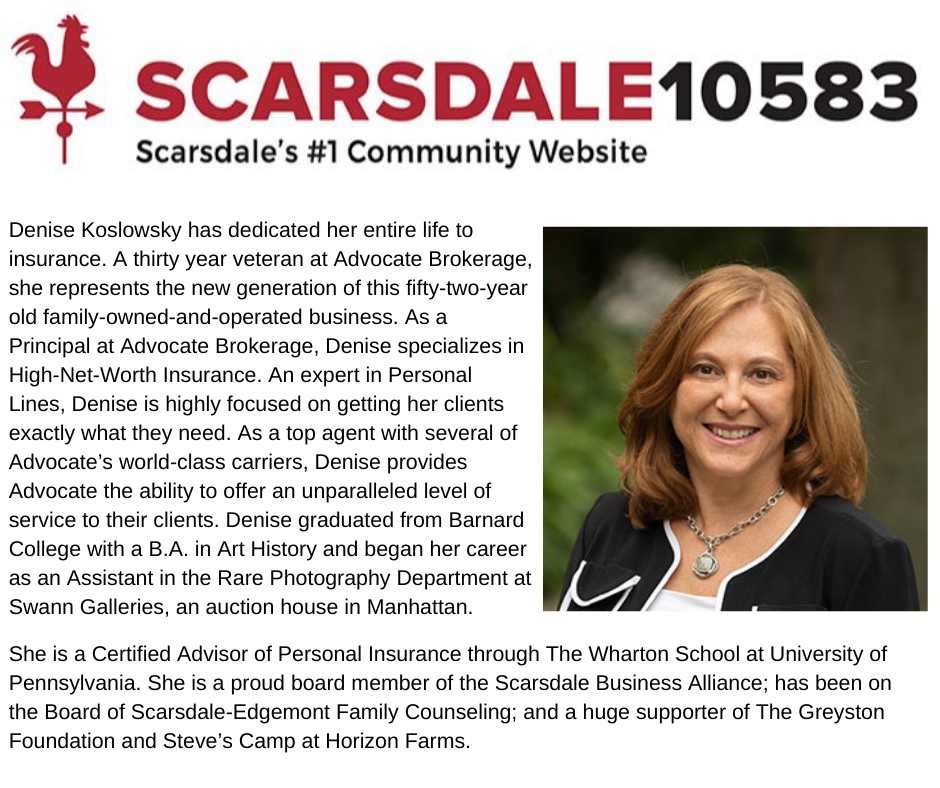2021-09-29
By: Advocate Brokerage

I was recently asked by the editor of a local online publication a question: Why doesn’t home insurance cover storm losses?
It was of course a very timely and important question. In the wake of Tropical Storm Ida, I was happy to offer my advice and wanted to be sure to share it with you!
With the weather becoming more severe, and climatologists predicting worsening storms, we have found ourselves at a property insurance crossroads where the coverage that is selected can make all the difference at the time of a loss. With the Covid Pandemic bringing throngs of new homebuyers to Westchester and Scarsdale, the ease of doing business on-line offered an inexpensive and quick option to so many. This also meant that without the guidance of a trusted insurance advisor, coverage such as water back-up and flood were almost certainly excluded.
The so-called 100-year storms are coming fast and furiously, and they are not coming 100 years apart. Climatologists avoid this description, so better to think of these as simply catastrophic weather events. We know Ida transformed New York into a danger zone, taking lives, homes, businesses, and cars with her. We previously experienced this with both Hurricane Irene, and Superstorm Sandy. And we know that the storms are getting worse and worse. Nonetheless, when buying a new home so many skip purchasing flood insurance and don’t know to purchase water back-up coverage (which is automatically provided on most premier home insurance policies). Homeowners Insurance policies always exclude flood, yet 90% of all natural disasters in the United States involve flooding, and often this occurs in low-risk areas.
There is a misperception that if you don’t live in a flood zone you don’t need or are not eligible for flood insurance. To clarify this, everyone in Scarsdale and Westchester County lives in a flood zone. Usually it is an X zone, which is a low-risk area that is often referred to as “not a flood zone”. The pricing is determined by the flood zone, so the less severe the flood zone, the less costly the policy. The most common flood insurance available is through National Flood Insurance Plan (NFIP) and is available to everyone. However, it does not provide any coverage for finishings in a below grade basement. It does provide coverage for utilities and cleanup costs, as well as structural damage to the dwelling.
The elite insurance carriers offer their own private flood solutions which provides limited coverage for a finished basement, includes replacement cost protection, and pays at a much better pay scale. NFIP is a government sponsored plan and does not provide replacement cost protection. So, if your air condenser was destroyed by flood, and you have a second one in your attic, and you can no longer purchase a replacement because the old freon units have been phased out, NFIP will not pay for the unit in the attic that now needs to be replaced because they do not provide replacement cost protection.
With severe weather comes sewage back-up and power outages. This is why it is so important to have high limits for water back-up coverage. Both sump pump failure and sewage back-up fall under this category, but can also be considered flood. The coverage varies from company to company. We have observed companies like Chubb which will provide coverage whenever it is not clearly flood, whereas others will deny. The damage is considered flood when a weather-related scenario produces ground water that enters the home through the walls, doors, or windows after first hitting the ground. If a drain is clogged and that causes the water to enter the house, the drain must be located inside an enclosed structure.
Very important to be aware that base flood policies, such as the ones offered through NFIP, only provide $250,000 of dwelling coverage and $100,000 of contents coverage. Private flood solutions are available for Excess Flood, which is an additional layer of coverage. With so many expensively finished basements in Scarsdale and Westchester, this additional layer of coverage is strongly recommended. It is commonly sold to coastal homeowners who are susceptible to storm surge, but if Ida has taught us anything, it is that all below grade basement are susceptible to flood.
*This article was originally published by Scarsdale 10583 on Wednesday September 22, 2021.